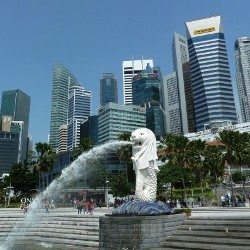Prospects of Singapore’s Casino and Tourist Market

After a crackdown on corruption in China, Chinese VIPs from Macau have been fleeing casinos based in the country’s only legal gambling resort of Macau to play in places where their every bet is not under scrutiny by the government. Australia and many countries in Asia have seen a major influx of Chinese tourists as a result, and have consequently experienced major growth in their gambling industries. One would think that the island nation of Singapore would be benefiting from the current gambling climate in China; however, recent figures show that there has been very little impact.
2016 A Record Year for Tourism
According to the Singapore Tourism Board, 2016 saw the number of tourists reach 16.4-million people, up by 7.7 per cent compared to the previous year, and representing a new record high for the country. Likewise, overall revenues from tourism grew by 13.9 percent to $17.5 billion, with most of the money spent was on food, drinks, shopping and accommodations. In 2016, the number of Chinese tourists to Singapore totaled 2.86 million, marking a 36 percent increase over the number that visited in 2015. This makes the Chinese the second biggest tourism market for Singapore, coming in just after the Indonesian market, which supplied 2.89 million tourists in 2016.
Gambling Revenues Flat
Despite the fact that the tourism industry is growing, the casino industry is not seeing a major upswing in its gross gaming revenues. Based on the state of the industry and market trends, Fitch Ratings predicts that the Singapore gambling industry will bring in just $4 billion in gross gaming revenue in 2017. If correct, this means that the market will stay relatively flat with very little growth over the next year. Fitch’s predictions may seem to defy logic at first glance, as in H1 of 2016 there was a 12.5 percent increase in gross gaming revenues from Chinese VIP tourists, which one would think would mean a lift in overall revenues.
Nevertheless, the casino industry derives a high amount of its revenues from high-rolling customers referred to as “whales”, and as Fitch noted recently:
“Gaming revenues continued a downward trajectory in 2016 largely due to a steep contraction in the VIP segment, despite a 12.5 percent gain in Chinese visitors (the biggest source of VIP revenue) in first-half 2016.”
Other Reasons for Pessimism
However, Fitch states that while there are more Chinese VIPs playing at Singapore’s two casino resorts, the overall interest in casino gambling is dwindling among those who call the country home. In fact, the ratings firm reports that Singaporeans are more interested in state-owned lottery games, and without locals filling the casinos, even Chinese mainland tourists who are big spenders are not enough to increase casino revenues.
“Most revenue comes from foreigners, as local residents are required to pay a SGD100 [US$71] entrance fee [for 24-hour access] and marketing to locals is heavily restricted,” noted Fitch.
Another reason that Fitch anticipates little growth in the gambling market in Singapore is competition. Currently, large integrated casino resorts are under construction or opening their doors in the Philippines and Macau. With tourism dollars being concentrated in other forms of entertainment, it’s clear that visitors to Singapore are interested in more than just gambling. As a result, Fitch believes that many tourists from China and beyond will be drawn to the new casinos in neighboring countries. In the meantime, Japan finally approved legislation in December that will allow the third-largest economy in the world to launch a casino industry for the very first time. It has been estimated that once established, its casino resorts will generate around $25 billion in annual gross revenue, which is likely to erode further at Singapore’s own casino market.
Lack of Domestic Competition
At the present time, Singapore only has two licensed casinos, both of which have 30-year concession agreements that have prevented new casino licenses from being issued. Industry insiders believe that it is these restrictive contracts that have stymied Singapore’s gaming market, and with no casinos able to open their doors, the country does not have the same large mega casino complexes that nearby nations do. Until those licenses expire in the 2030s, it might be a safe bet that the industry will remain flat.







